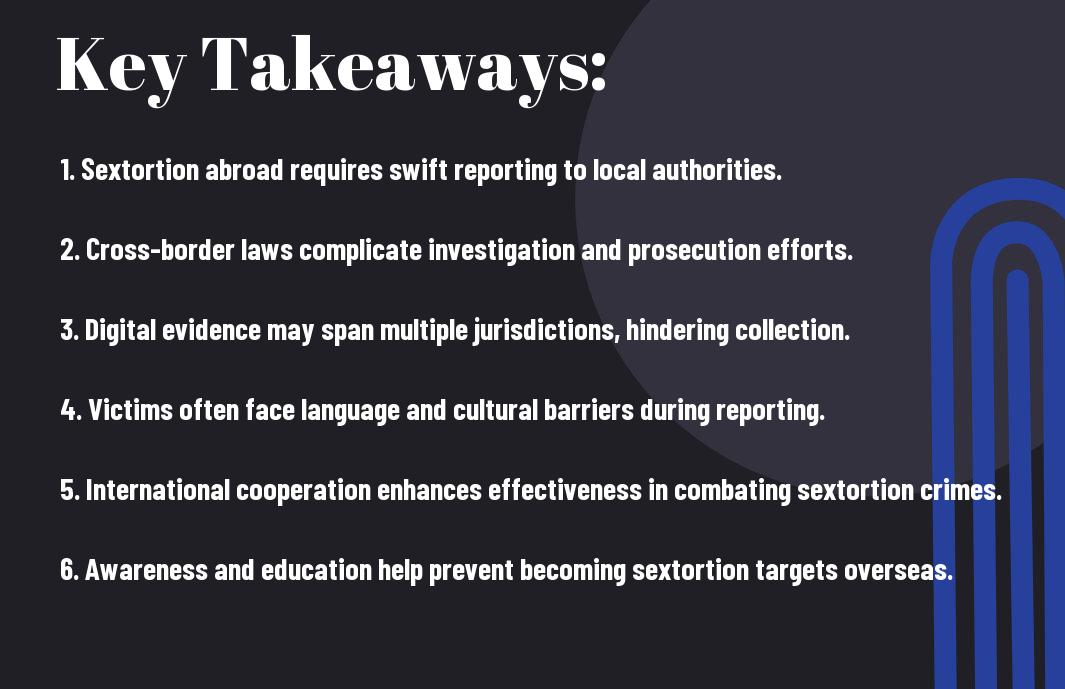Sextortion involves the use of threats to exploit individuals for explicit material, often leading to devastating consequences. If you find yourself a victim of this type of cross-border cybercrime, understanding your rights and the reporting procedures in different jurisdictions is necessary for your safety. Engaging with local law enforcement and international entities can enhance your chances of receiving support and recovering from this harrowing experience. Navigating through the complexities of international laws will empower you to take back control and combat these illicit activities more effectively. Use this international sextortion reporting guide from Digital Forensic Squad to learn about how to go about reporting international sextortion threats.
Key Takeaways:
- Cross-border laws and jurisdiction complexities significantly hinder the effective prosecution of sextortion cases, necessitating international cooperation and communication among law enforcement agencies.
- Victims of sextortion often face challenges in reporting due to fear of stigma or lack of trust in authorities, highlighting the need for improved support systems and awareness campaigns.
- The evolving nature of technology plays a significant role in facilitating sextortion, emphasizing the importance of awareness and education on safe online practices to prevent victimization.
Understanding Sextortion and Its Impact
For those navigating the digital landscape, it is vital to comprehend the complexities of sextortion and how it affects victims worldwide. This form of cybercrime often employs manipulation through illicitly obtained explicit content to extort money or further exploitation, ultimately leaving individuals feeling vulnerable and trapped in a cycle of shame and fear.
Definition of Sextortion
Behind the term sextortion lies a disturbing trend in which perpetrators exploit intimate images or videos to extort money, favors, or additional content from victims. Often perpetrated online, these threats can take various forms, with the intent of extracting as much as possible from you through coercion and fear.
Psychological and Emotional Effects
Sextortion can have devastating effects on your mental health and well-being. Many victims face feelings of shame, anxiety, and isolation, leading to a significant decline in self-esteem. The impact can be profound, often causing you to withdraw from social connections and support systems while grappling with the fear of exposure.
In fact, the psychological toll of sextortion extends beyond immediate distress; it can lead to chronic issues such as depression and post-traumatic stress disorder (PTSD). Victims may find themselves in a continuous state of fear, often questioning whom they can trust or whether they will be targeted again. The emotional scars can linger, affecting relationships, job performance, and overall quality of life. It’s vital to seek help and support to navigate through these intense feelings and reclaim your well-being.

The Scope of Cross-Border Cybercrime
Some individuals are increasingly targeted by cross-border cybercriminals who exploit the anonymity of the internet. Sextortion, in particular, has surged due to the ease of accessing victims worldwide. Understanding the scope of this issue is vital for effective reporting and prevention, as it affects personal safety and mental health across borders.
Global Trends in Cybercrime
Among the notable trends, the rise of sextortion scams has alarmingly increased, often facilitated by social media and dating platforms. These scams prey on vulnerable individuals, using technology to manipulate emotions and extract sensitive information. Keeping abreast of these trends can help you better protect yourself from becoming a victim.
Legal Challenges in Addressing Cross-Border Issues
Among the challenges you may face in addressing cross-border cybercrime is the lack of uniform legal frameworks across different jurisdictions. This discrepancy complicates law enforcement’s ability to pursue offenders effectively and can prevent timely resolution for victims seeking justice.
Another notable issue is the extraterritorial application of laws. Different countries often have varying definitions of cybercrime and law enforcement capabilities. This fragmentation creates significant barriers, as you may find yourself dealing with a perpetrator in a country where the laws are less stringent or where cooperation with your home country’s law enforcement proves difficult. Navigating these legal waters demands a profound understanding of both your local laws and international regulations, as well as close collaboration with authorities and legal experts.
Reporting Mechanisms for Sextortion Abroad
To effectively address sextortion situations abroad, it is vital to familiarize yourself with the appropriate reporting mechanisms. You should start by collecting all pertinent information regarding the incident, including the identity of the perpetrator, any associated online platforms, and evidence of communication. Additionally, reach out to local law enforcement agencies and international organizations specializing in cybercrime for further guidance and support.
International Law Enforcement Collaboration
Before taking action, understand that international law enforcement often collaborates through various channels. These collaborations can be instrumental in addressing cross-border challenges of sextortion, as data and intelligence sharing between agencies increase the likelihood of apprehending offenders. Your detailed reports and testimonies can enhance this collaborative effort, highlighting the need for a united approach to combat cybercrime effectively.
Reporting Platforms and Support Services
To enhance your chances of seeking justice, utilize available reporting platforms and support services designed for sextortion victims. These resources can guide you through the process of filing reports and connecting with necessary support systems.
For instance, many countries offer dedicated hotlines and online platforms where you can report sextortion anonymously. These platforms often provide access to legal advice and emotional support, which is imperative in navigating the aftermath of such experiences. Organizations such as the CyberTipline and local cybercrime units can assist you in taking appropriate action, safeguarding your privacy, and ensuring your case is documented and investigated. Utilizing these resources can empower you to reclaim your narrative and seek justice effectively.
Prevention and Awareness Strategies
Once again, protecting yourself from sextortion abroad begins with being aware of the risks and taking proactive steps. It’s imperative to educate yourself about the tactics used by cybercriminals, such as manipulation and coercion, and to remain cautious when sharing personal information online. You can also strengthen your online security, like using strong passwords and enabling two-factor authentication, to help safeguard your digital presence from unwanted threats.
Educational Initiatives
Across various platforms, educational initiatives are paramount in combating sextortion. You should seek out workshops, webinars, and online resources that focus on digital safety practices and the signs of potential exploitation. By empowering yourself with knowledge, you enhance your ability to recognize threats and respond appropriately.
Community Engagement and Support
By actively participating in community engagement and support initiatives, you contribute to a united front against sextortion. Local organizations and support groups can provide resources, education, and a sense of solidarity that is vital for individuals affected by this crime.
Understanding the importance of community support can greatly enhance your resilience against sextortion. Participating in local groups allows you to share experiences, gain insight, and foster a network of trusted individuals who can provide help and guidance. These connections can empower you, offering the opportunity to discuss uncomfortable topics and ensuring that you are equipped with practical strategies to recognize and report cybercrime. In a community setting, you’ll find a shared commitment to creating a safer environment for yourself and others, making it a key aspect of prevention strategies.

Case Studies and Real-Life Examples
Your understanding of cross-border sextortion efforts can be enhanced by examining these notable case studies:
- 2019 Global Investigation: Authorities from 19 countries collaborated, leading to the arrest of 29 suspects and over 200 victims identified.
- US-Philippines Operation: An operation in 2020 disrupted a sextortion ring, resulting in 50 arrests and a 50% reduction in reported cases within the region.
- UK Case Study: In 2021, a 17-year-old received a four-year sentence for operating a sextortion scheme, highlighting the youth involvement in these crimes.
Notable Sextortion Cases
One of the most alarming cases involved a coordinated attack that affected over 2,000 individuals globally, leading to significant media coverage and public awareness aimed at combating this pressing issue.
Lessons Learned from Successful Interventions
The collaboration between international law enforcement agencies has proven effective in combating sextortion abroad, as seen in various operations emphasizing communication and sharing of intelligence.
Another insightful intervention illustrates that creating public awareness campaigns alongside robust reporting mechanisms can significantly empower victims. By fostering an environment where you feel safe to report instances of sextortion, law enforcement can act more swiftly. Highlighting successful prosecutions can also serve to deter potential offenders, while enhanced victim support services build trust in authorities. Overall, combined efforts of education, advocacy, and decisive intervention not only reduce the incidence of sextortion but also strengthen your community’s resilience against such threats.
Future Directions in Tackling Sextortion
After addressing the immediate aftermath of sextortion incidents, the next steps involve establishing a multi-faceted approach to combat this growing threat. By fostering international cooperation among law enforcement agencies, adopting innovative technologies, and raising public awareness, you can play a vital part in protecting individuals from falling victim to these online predators. Together, we can shape a future where sextortion is a diminishing concern.
Technology and Innovation in Prevention
Among the strategies for prevention, leveraging advanced technologies like artificial intelligence and machine learning can help identify potential threats and patterns of sextortion. You should advocate for tools that enhance online safety and empower users to understand risks, enabling proactive measures in safeguarding against potential exploitation.
Policy Recommendations and Advocacies
The development of comprehensive policies is necessary in addressing sextortion effectively. You can support initiatives that advocate for stricter regulations, improved reporting mechanisms, and educational programs tailored to equip individuals with awareness of the risks involved in sharing personal information online.
Another effective approach involves promoting the establishment of cross-border cooperation among nations to share intelligence and resources. You can encourage your representatives to push for a unified global response, fostering an environment where individuals have access to enhanced support systems and legal recourse. Advocating for the inclusion of safe spaces for victims to report incidents without fear of repercussion can also play a significant role in encouraging others to come forward and seek help. By collectively pushing for these measures, you can contribute to building a fortification against sextortion and protect vulnerable individuals worldwide.
Summing up
With these considerations, it is evident that tackling sextortion and cross-border cybercrime requires your active engagement and understanding. By being informed of the challenges and resources available you can better protect yourself and contribute to global efforts against these offenses. Awareness and vigilance are key components to navigating and combating this evolving threat effectively.
FAQ
Q: How can victims of sextortion abroad report the crime effectively?
A: Victims of sextortion can take several steps to report the crime effectively. First, they should gather all evidence, including screenshots of chats, emails, and any relevant communications. They can report the incident to their local law enforcement agency, which may have resources or partnerships to handle cross-border cases. Additionally, victims may contact organizations specializing in cybercrime or sextortion for guidance. Many countries also have cybercrime units that can assist in expediting international cooperation between law enforcement agencies.
Q: What international resources are available for addressing sextortion and cross-border cybercrime?
A: Various international resources can assist victims of sextortion and address cross-border cybercrime. Organizations such as INTERPOL and Europol are involved in global cooperation to combat cybercrime, and they provide frameworks for reporting and responding to such incidents. Additionally, non-governmental organizations (NGOs) focused on cyber safety may offer confidential support and legal advice. Victims are encouraged to consult these organizations for expertise on navigating legal systems and reporting procedures in different countries.
Resources :

